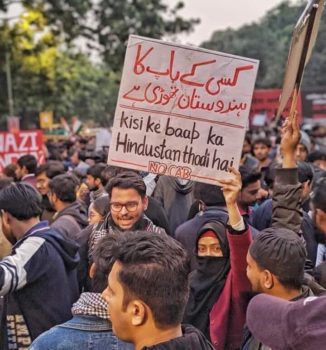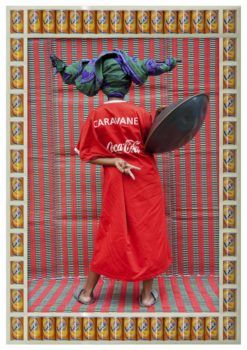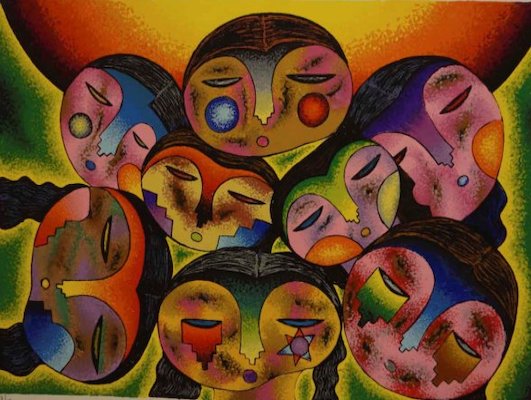Dear Friends,
Greetings from the Tricontinental: Institute for Social Research.

Áñez with her Evangelical Bible, 2019.
Jeanine Áñez, the ‘president’ of Bolivia, walked into the Burned Palace (Palacio Quemado) with an enormous Bible in her hand. ‘The Bible has returned to the Palace’, she said as she seized power. Áñez’s Party–Movimiento Demócrata Social–won only 4% of the vote in the 2019 presidential election, and she is not in the direct line of succession. The Movement to Socialism (MAS) controlled the majority in parliament, and its speaker–first Adriana Salvatierra and then Mónica Eva Copa–stood ahead of her in the queue. Nonetheless, as MAS officials stayed home for fear of their lives, a parliamentary vote that excluded the majority party took place in which Áñez took power. The military backed her. Very soon thereafter, the United States and Brazil sanctified this Christian fundamentalist right-wing politician as the president.
The Generals stood beside Áñez as she took her oath. Hovering nearby was Luis Fernando Camacho, whose political party (Movimiento Nacionalista Revolucionario) won only 0.69% of the vote in the presidential election. Nonetheless, Camacho is the kingmaker. He is the leader of the Civic Committee of Santa Cruz and the Santa Cruz Youth Union (Unión Juvenil Cruceñista)–both bodies tinged with pro-business fascism. Camacho followed Áñez into the palace. He was holding a crucifix. ‘Pachamama will never return to the palace’, he said. ‘Bolivia belongs to Christ’.
Beneath the volcanic eruption of Áñez and Camacho is the lava-like growth of the right-wing evangelical movement. In the 2019 presidential election, Áñez was not the standard-bearer for evangelism. Chi Hyun Chung (who won nearly 9% of the vote) and Victor Hugo Cárdenas (who won 0.41% of the vote) had the strongest evangelical credentials. During the lead-up to the vote, it was Chi who was called the ‘Bolivian Bolsonaro’. Bolivian sociologist Julio Córdova Villazón found that these men–Chi and Cárdenas–erased the separation between Church and State and relied upon the vast network of evangelical churches and television programmes to run their campaign. After the election, Julio Córdova said that it was Camacho, the man who installed Áñez to the presidency, who legitimised his authoritarianism through ‘Bolsonaro-style religious discourse’.

José Tola, El rapto de Europa, 2019.
Jair Bolsonaro, the president of Brazil, is–like Camacho and the others–rooted in these transnational evangelical neo-Pentecostal networks. But this is not an affliction of the fundamentalist versions of Christianity – such as neo-Pentecostalism–alone; there is evidence from around the world of these sorts of authoritarian religious movements that are pickled in hatred and rooted in praise of militaries and capitalism. It is no wonder that the Indian Prime Minister Narendra Modi–who emerges from his own authoritarian religio-political movement–invited Bolsonaro to be the Chief Guest at India’s Republic Day Parade on 26 January 2020. There is little that divides Modi’s fascistic Rashtriya Swayamsevak Sangh (RSS) and his Vishwa Hindu Parishad from the piety movements of Tablighi Jamaat (with its millions of Muslim followers) and these neo-Pentecostal formations. There is an enormous amount that they share in common.
Our researchers in Buenos Aires (Argentina) and in São Paulo (Brazil) have developed a preliminary theory of these neo-Pentecostal movements in South America. The team in Buenos Aires has published a report (in Spanish) on the Evangelical Question, while the team in São Paulo has produced an as yet unpublished document on the rise of neo-Pentecostalism in Brazil (André Cardoso and Fábio Miranda, ‘Contribuições para entender o crescimento pentecostal e os desafios para o campo popular’).
One of the common features of the findings in Argentina and in Brazil is that these movements are growing at an astronomical rate, doubling in twenty years. In both countries, these movements have jumped into the electoral sphere, where they have begun to define an ‘evangelical vote’. This consolidation of evangelism in politics polarises sections of the working class and peasantry. The analyses from our two offices are very close to each other, and they both point to at least five features of these movements:
-

TV Santhosh, Blood and Spit, 2009.
Heart in a Heartless World. Over the course of the past few decades, as social inequality has increased, the purchasing power of the urban and rural poor has declined while the time and money for leisure activities has been reduced. With the cuts in social spending, State-funded community activities have also lessened. This has meant that in the neighbourhoods of the poor, commercial and State-funded avenues for social life have vanished. Near Brazil’s favelas, the storefronts are now occupied by a line of neo-Pentecostal churches, by liquor shops, and by a few restaurants. It is these neo-Pentecostal churches that operate as one of the key places for social life in these working-class communities and as an employment agency for its members. As the Church becomes a hub for social life–including music lessons–it attracts young people into its ranks. Few other outlets are available for the working class.
- ‘Gender Ideology’. In South America, the feminist movement, particularly the movement for abortion rights, has strengthened. In reaction, these religious currents have consolidated a patriarchal response. They make the argument that the elite is trying to colonise the families of the poor by eroding the authority of the father. These piety movements and their political allies routinely uphold patriarchal attitudes towards women, seeking to retroactively control all aspects of their lives and keep them subdued and submissive.
RSS leader Mohan Bhagwat often says that women should not work, that they should rely upon their husbands. By putting the Father on a pedestal, these movements take their authoritarian ethos of the Strong Leader into the heart of the family.
-

‘This is Not Your Dad’s India’. Protest in New Delhi, December 2019.
Racism. Camacho’s statement that Pachamama–an indigenous Andean spiritual concept–has no room in the presidential palace in Bolivia is just one of a million pieces of evidence that suggest the deep hatred that this seam of evangelism has for any form of life that does not follow its precepts. Both Áñez and Camacho have made racist statements about the indigenous communities of Bolivia, whose faith they consider ‘satanic’. The RSS view of Muslims and the adivasis (indigenous), and the Tabligh’s view of apostates (murtadds), mirror this attitude.
- Made in the USA. Our teams in Buenos Aires and São Paulo find that this form of evangelism was exported from the United States. Anthropologist Rita Segato suggests that there has been a concerted effort to export this form of religiosity into the Global South as a means to disorient and fragment the working class and peasantry and to undermine national liberation movements. Indeed, in the 1960s, the United States, Saudi Arabia, and others pushed a narrow and suffocating form of Islam through the World Muslim League to undermine the growth of socialist movements from Indonesia to North Africa. Just before he was executed, the Egyptian leader of the Muslim Brotherhood Sayyid Qutb described his organisation as part of a tendency that he called ‘American-made Islam’.
Evidence for Segato’s view came to us a decade ago when Dr. Kapya Kaoma and Political Research Associates showed how U.S. conservative evangelicals–assisted by the U.S. government–pushed an agenda of homophobia in Africa (Kenya, Nigeria, and Uganda). Little wonder that these currents–including the current led by Áñez and Camacho–are cosy with the military and with imperialism. Even if the push comes from the U.S. evangelicals, or–in the case of this ‘American-made Islam’–from the CIA, it finds its own allies amongst ruling elites and others who drive an agenda rooted in older religious forms but weaponised for their aims.
It is out of this deeply violent seam of authoritarian neo-Hinduism that the BJP government in India passed the Citizenship (Amendment) Bill that undermines the right of Muslims to be Indian citizens; and it is out of this seam that it has shut down Kashmir and now parts of the North-East and sent in the police forces to attack the students at Aligarh Muslim University (Uttar Pradesh) and Jamia Millia Islamia University (New Delhi).
-

Hassan Hallaj, Caravane, 2011.
The Prosperity Gospel. Neo-Pentecostal churches and neo-Hindu gurus operate amongst people who are often the poorest of the poor, and yet it is amongst these social groups that they promote a ‘prosperity gospel’. It is not merely that these tendencies use the opportunities of the modern world–the media and the market–to push their aims; it is that they promote the values of neoliberalism amongst the working-class–be an entrepreneur, don’t become a trade unionist.

Ahmed Faraz
These movements draw from older traditions, but they refashion themselves for neoliberal times. It is not as if they provide a necessary spiritual antidote for populations bereft of social life because of the neoliberal assault; other forms of ‘spiritual’ comfort are available, forms of social coexistence that are secular and progressive. But as the institutions of working-class culture are summarily destroyed in many countries; these forms–including neighbourhood and trade union gatherings–are overrun by the well-funded religion-oriented assemblies. A genuine sociology of these neo-religions should not avoid looking into the dark corners, where the ruling elites sit and write their support with cheques; in the bright lights, we see the working class stumble in and seek a soul in soulless conditions, but the lights are so bright that they often cannot see into the corners.
Aye subh ke ghamkharo, is raat se mat darna.
Jis haat me khanjar hai, us haat se mat darna.
You who search for the dawn, do not fear the night.
Do not be afraid of the hand that holds the dagger.
Fear is the ethos of this neoliberal religiosity. The Pakistani poet Ahmed Faraz saw this fear and shrugged. He counsels bravery.
One of the brave ones is Bolivia’s Evo Morales, now in exile in Argentina. When he was in Mexico City, he spoke to The Intercept’s Glenn Greenwald about the coup in Bolivia, and about the social forces afoot in South America. Please do watch:

